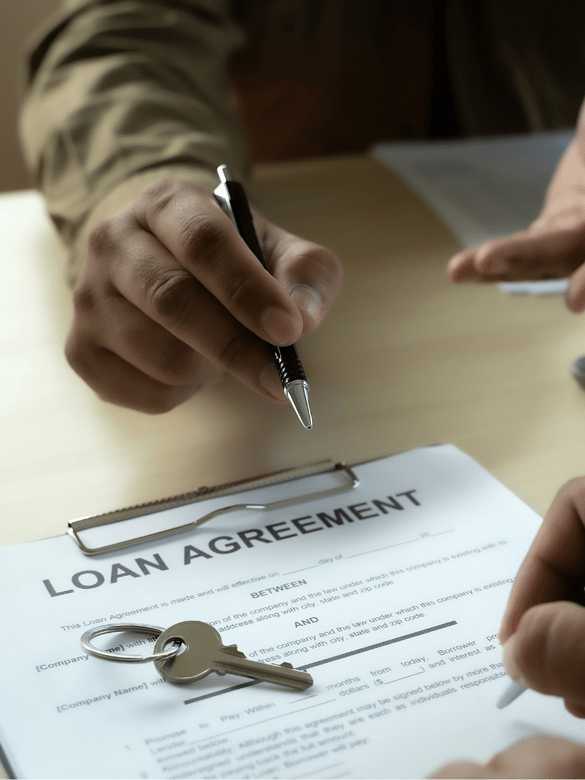%20(5).png)
SMALL BUSINESS ADMINISTRATION LOANS
Starting a small business is a thrilling experience, but it can also be a costly one. There are countless expenses to consider, from equipment and inventory to hiring employees and marketing your products or services.
While banks are solid financing partners, many online lenders, like Yardline, offer the same types of funding and services and provide these funds quickly and easily.
Let’s explore small business administration (SBA) loans and how they can help you make your business successful.
WHAT ARE SMALL BUSINESS ADMINISTRATION LOANS (SBA)?
The U.S. Small Business Administration (SBA) is a government agency that provides SBA loans to small businesses. They help small businesses get funding by setting guidelines for loans and reducing lender risk and making it easier for small business owners to receive the funding they need.
Additionally, while issued by a private lender, SBA loans are backed by the federal government.
SBA loans range from small to large amounts and can be used for most business purposes, including inventory, hiring, and marketing efforts. They also offer lower interest rates and longer repayment terms than traditional bank loans.
The most common types of SBA business loans include:
- SBA 7(a) loans - SBA’s primary loan program that guarantees portions of the total amount, caps interest rates, and limits fees. The maximum loan amount guaranteed under this program is five million.
- SBA 504 loans - Guaranteed up to five and a half million, these loans are used to purchase long-term, fixed-rate financing loans to purchase or repair assets like land, machinery, and facilities.
- SBA express loans - Fast funding, up to $500,000, for working capital, expansion, real estate, and equipment purchases.
- SBA microloans - The smallest SBA business loan program, microloans offer $50,000 or less to help small businesses start up and expand their business.
- SBA disaster loans - Used to repair physical damage and cover operating expenses due to declared disasters. Loan sizes can be up to two million.
To qualify for an SBA loan, your business must meet certain criteria, including being a for-profit business, operating in the United States, and meeting certain size requirements.
PROS AND CONS OF SBA LOANS
Competitive rates - Lenders base SBA loan interest rates on a base rate plus an additional percentage by the lender. The base rate is typically based on the prime rate, LIBOR, and while this can change over time, the interest rates are subject to SBA maximums. This ensures that SBA loans stay affordable for borrowers.
Longer terms - Business owners borrowing money through SBA business loans get more time to repay them, meaning they will have more money available for other business needs. The loan term depends on how businesses plan to use the money. For example, if using it to purchase real estate, the term is twenty-five years.
Lower fees - Though many SBA loans come with upfront guarantees, determined by the loan amount, maturity of the loan, and a yearly service fee, these guarantees are based on a portion of the outstanding balance. Plus, there are no upfront fees or annual service fees for SBA 7(a) loans of $500,000 or less.
Large loan amounts - The amount businesses will receive from SBA lenders will vary depending on the type of loan and a business’ qualifications. That said, SBA loans generally offer large loan maximums like five million for the 7(a) loan program and five and a half million for the 504 loan program.
Difficult to qualify - Despite the government guarantee, SBA lenders still have strict eligibility criteria that businesses must meet in order to get an SBA loan. Most businesses need several years in the business, strong business finances, and good credit history.
Slow approval and funding times - Depending on the lender and loan type, the SBA loan application and approval process can take between one to three months to access the funds. Not to mention the SBA loan application itself is detailed and requires extensive documentation. Borrowers should consult their local SBA district office to ensure they get connected with the correct loan program and SBA-approved lender.
Collateral - Many lenders will require businesses to pledge a personal guarantee and assets as collateral in order to receive an SBA loan.
Borrowers may need to make a down payment - It’s typically for borrowers to make a ten to twenty percent down payment in order to secure the SBA business loan. Especially since SBA lenders are more likely to work with borrowers who invest their own equity into their business. Thankfully, the down payment requirements are still cheaper than conventional loans.

ARE SBA LOANS RIGHT FOR YOUR BUSINESS?
Small business administration loans are attractive to many small business owners because of their guarantees and lower interest rate caps.
Plus, the loans are facilitated by SBA-approved lenders and the SBA will reimburse the lender for a percentage of the debt if the borrower defaults on the loan. This greatly reduces lender risk and can even increase the small business owner’s approval odds.
However, the SBA loan application and approval process can take months and may not be the best option if a business owner is looking to acquire the money quickly. Additionally, if you do not have a good credit history, it’s even harder to qualify.
HOW TO APPLY FOR SBA LOANS
First and foremost, small business owners looking to apply for SBA loans should ensure they qualify and work with a preferred lender, like Yardline, to reduce the time it takes for approval and funding.
SBA lenders like businesses that have been in operation for at least two years have strong annual revenue and a good credit score. Additionally, charitable and religious institutions are ineligible for these loans.
Then, gather the required documents, which will vary based on the loan type. These documents can consist of:
- SBA’s borrower information form
- Statement of personal history
- Personal and business financial statements
- Personal and business tax returns
- Business license
- Loan application history
- Business owner’s resume
- One-year cash flow projection
After you submit your application, it’s time to wait to be approved. If you need the money sooner, and choose an SBA express loan, it will likely be responded to within thirty-six hours.
As a lender of SBA loans, Yardline is here to walk you through all your options and get you the funding you qualify for (from $5k to $20 million). Our SBA rates range from 12-30% APR and it's our most flexible repayment option.
Did we mention we use one, simple application to provide applicants access to a suite of funding solutions, including SBA loans, small business loans, business and personal credit cards, revolving lines of credit, and so much more?
And it’s all in as fast as twenty-four hours.
What are you waiting for? Apply for funding with Yardline today.

